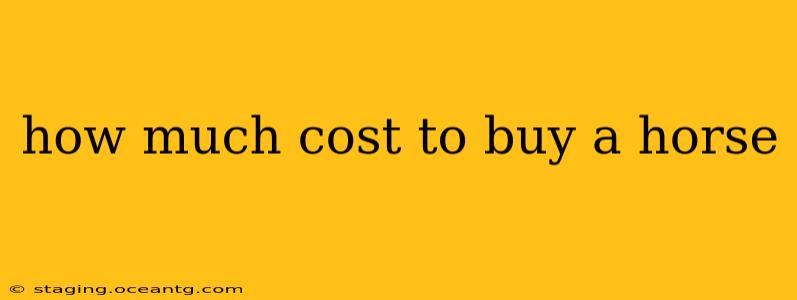How Much Does it Cost to Buy a Horse? A Comprehensive Guide
The cost of buying a horse is highly variable and depends on several key factors. It's not a simple answer like "X dollars," but rather a range influenced by breed, age, training, and location. This guide will break down the costs involved and help you understand what to expect.
Factors Affecting the Price of a Horse:
Several factors significantly impact the final price tag:
-
Breed: Thoroughbreds, Arabians, and certain Warmbloods can command significantly higher prices than more common breeds like Quarter Horses or Mustangs. Rare or highly sought-after breeds will also be more expensive.
-
Age: Younger horses, especially those still needing training, are generally less expensive than seasoned, well-trained adults. However, a highly trained and proven adult horse will also command a premium price.
-
Training & Discipline: A horse trained in a specific discipline (e.g., dressage, jumping, western pleasure) will cost more than an untrained horse. The higher the level of training, the higher the cost.
-
Health & Conformation: A sound, healthy horse with good conformation (physical structure) is more valuable than one with health problems or poor conformation. Veterinary examinations are crucial to assess health and identify potential issues.
-
Location: Horse prices can vary geographically. Areas with higher concentrations of horse farms or specific breeds may have higher prices.
-
Seller: Private sellers typically offer lower prices than established breeders or dealers.
Typical Cost Ranges:
While exact figures are impossible to provide, here are some general cost ranges to give you a better idea:
-
Untrained or minimally trained horses: $500 - $5,000 (often younger horses or those requiring significant training). This range can include rescues or horses with unknown histories.
-
Well-trained horses for specific disciplines: $5,000 - $50,000+ (this can vary significantly based on the horse's level of training, competition record, and pedigree). Top-level competition horses can sell for hundreds of thousands of dollars.
-
Rare or highly sought-after breeds: $10,000 - $100,000+ (this range is highly dependent on the breed's rarity, pedigree, and the horse's individual qualities).
What are the additional costs beyond the purchase price?
Buying the horse is only the beginning! Consider these ongoing expenses:
H2: What are the ongoing costs of owning a horse?
Owning a horse is a significant financial commitment. Beyond the initial purchase price, you must factor in ongoing costs such as:
-
Boarding: This typically ranges from $300 to $1,500+ per month depending on the facilities offered (stalls, paddocks, pasture access, feeding, etc.).
-
Feed and Hay: Expect to spend $50-$200+ per month on high-quality feed and hay. The quantity and type of feed will vary depending on the horse's size, age, and workload.
-
Farrier: Regular hoof care is essential. Expect to pay $50-$150 per visit every 6-8 weeks.
-
Veterinary Care: Routine vaccinations, dental care, and occasional illnesses or injuries can lead to significant veterinary bills. Budget for at least $500-$1000 annually, but emergencies can easily surpass this.
-
Tack and Equipment: You'll need saddles, bridles, halters, and other equipment which can cost several hundred to thousands of dollars, depending on the horse's discipline and rider's needs.
-
Insurance: Equine insurance can protect you against veterinary expenses, theft, or accidental death. Costs vary depending on the horse's value and the type of coverage.
-
Transportation: Transporting your horse to and from events or the vet will incur costs.
H2: Where can I find horses for sale?
You can find horses for sale through various avenues:
-
Online marketplaces: Websites specializing in horse sales (such as Equine.com or DreamHorse.com) list horses for sale across various breeds and disciplines.
-
Local breeders: Connecting with breeders in your area offers a great way to find horses, particularly if you're seeking a specific breed.
-
Horse shows and events: Many horse shows and events include vendors and sellers offering horses for sale.
-
Rescuers and shelters: Consider adopting a horse from a rescue organization. This can be a more affordable option and often helps a horse in need.
H2: How do I determine if a horse is worth the asking price?
Thorough due diligence is crucial. Before purchasing, always:
-
Get a pre-purchase veterinary examination: This is vital to identify any potential health issues that could lead to significant expenses in the future.
-
Assess the horse's training and temperament: Ensure the horse's temperament and training level align with your experience and riding goals.
-
Research the breed and market value: Use online resources and consult with experienced horse owners to get a sense of the typical price range for similar horses.
Buying a horse is a big decision. Carefully weigh the financial commitment against your experience level and personal resources. Remember that the initial purchase price is just one aspect of horse ownership; ongoing costs are significant and should be factored into your budget.
